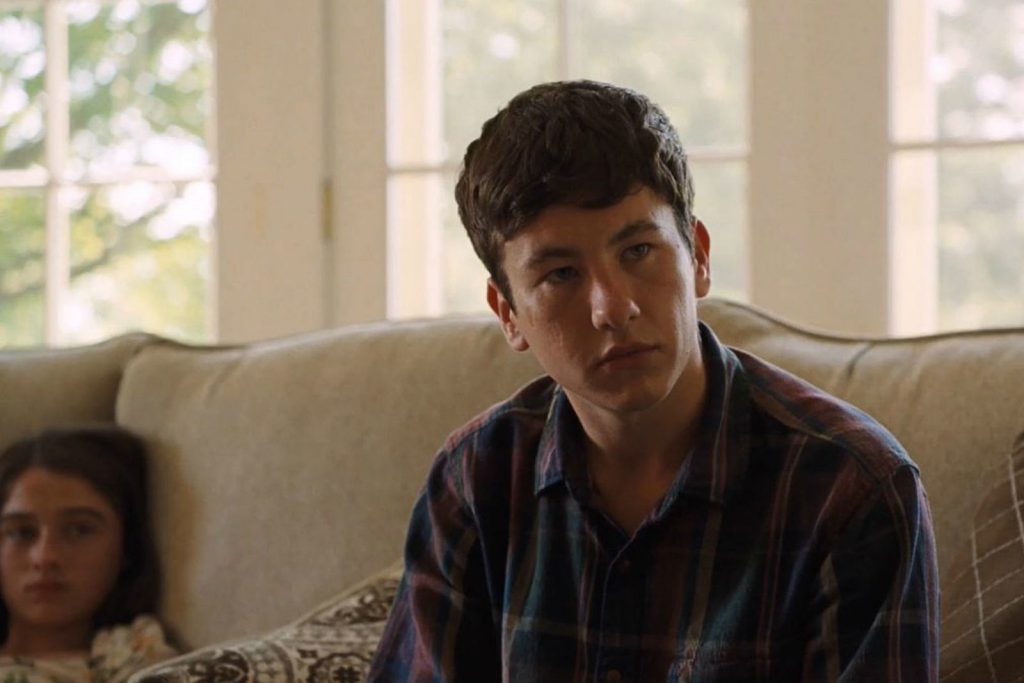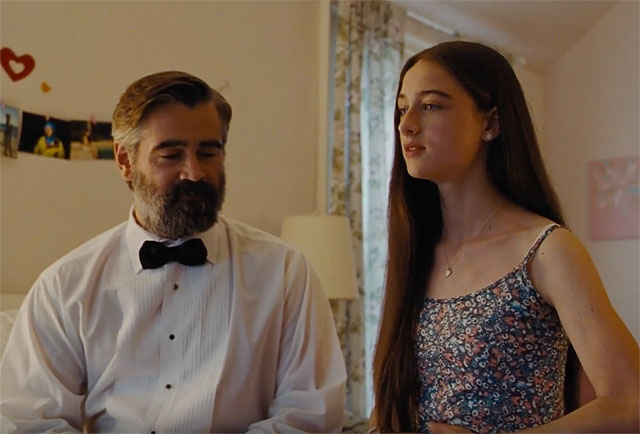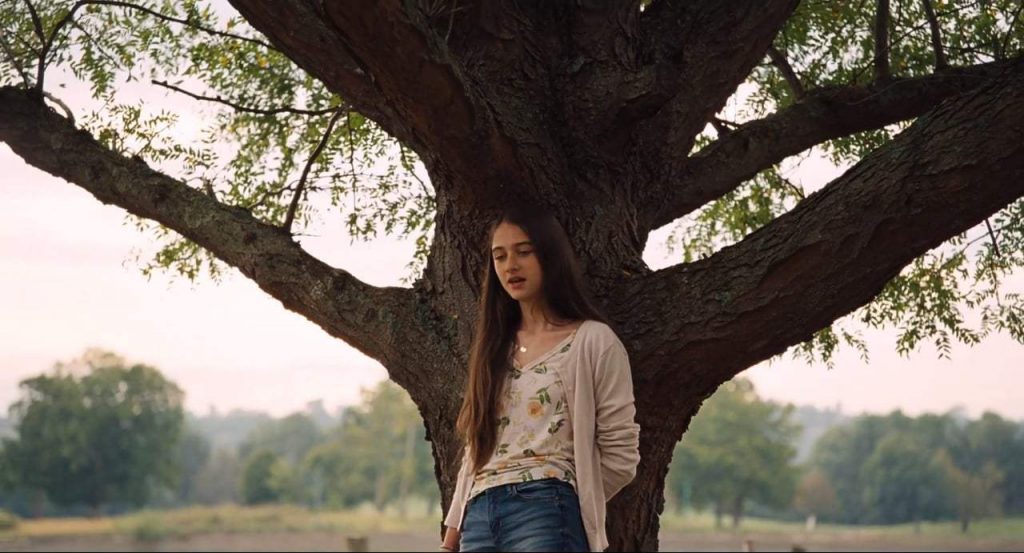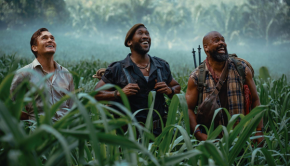The Killing of a Sacred Deer – Film Review
Reviewed by Damien Straker on the 16th of November 2017
Madman presents a film by Yorgos Lanthimos
Produced by Ed Guiney and Yorgos Lanthimos
Written by Yorgos Lanthimos and Efthymis Filippou
Starring Colin Farrell, Nicole Kidman, Barry Keoghan, Raffey Cassidy, Sunny Suljic and Alicia Silverstone
Cinematography Thimios Bakatakis
Edited by Yorgos Mavropsaridis
Running Time: 120 minutes
Rating: MA15+
Release Date: the 16th of November 2017
The focus of The Killing of a Sacred Deer is Steven (Colin Farrell), a surgeon who is friends with a young man named Martin (Dunkirk’s Barry Keoghan). To please Martin, Steven goes as far as buying him a new watch. The reason for this is because he feels bad about Martin’s father dying on the operating table after a car accident.
At home, Steven is married to Anna (Nicole Kidman) and they have two children together. Their daughter Kim (Raffey Cassidy) is a teenager who is in the school choir, while their younger son Bob (Sunny Suljic) is told that he needs a haircut; he never abides by this and lets his hair grow long.
One evening Martin tries fixing Steven up with his mother (Alicia Silverstone) but the plan fails; consequently, strange things start happening to the children. Kim and Bob are left paralysed, and they must be hospitalised while Steven, Anna and their medical team try to solve the problem. Martin presents himself as the agent of these problems but says it will end if Steven fulfils a deadly ultimatum.
The Killing of a Sacred Deer is directed by Greek filmmaker Yorgos Lanthimos, who is quickly establishing himself as the new king of weird. Many praised his film Dogtooth (2009) and also adored his first English-language feature The Lobster (2015), which was about a society that turned people into animals and forced them to find new love.
I found The Lobster to be only half a movie; it was a clever idea but not fully developed enough to sustain an entire film. Here he continues the same filmic style purported by The Lobster, specifically a deadpan, straight-faced and understated tone that makes his work dark, slow but also very funny in parts.
Some are embracing Lanthimos’ urgency to be different and weird, which is certainly attractive, while others are likely to find his films strange, too ambiguous and alien. I am falling somewhere in-between on his new brand of craziness. Like its predecessor, Sacred Deer doesn’t feel complete enough to sustain a narrative running close to two hours long.

It’s an ambiguous and sometimes compelling mystery, but there’s too many puzzle pieces missing. On the upside, you’re left thinking about the story, which admittedly is a lot more than one could say for many films these days.
Even Lanthimos himself concedes that he doesn’t have all the answers, which is concerning. Are films like this merely a case of the emperor’s clothes as we blindly search for meaning? There are some patterns in Sacred Deer we can reflect upon, but nothing concrete enough that on one viewing we can confidently say why things are happening a certain way.
Nonetheless, one of Lanthimos’ most interesting goals is declaring a war on story logic. No one can say how or why these terrible things are happening to the children, which is interesting for a while. Is it possible that Martin is the Devil? One could also describe him as representing equilibrium. He’s angry about his father’s death and blames Steven; in Biblical terms, he feels as though someone in Steven’s family must die to make life balanced again.

The aspect of the story where the various curses attack the children is not unlike the Plagues of Egypt where terrible things unfold until a decision is made. Steven is also a medical expert looking for hard answers, which complements the Biblical elements, such as his daughter attending a Catholic school, the retribution theme, and the Devil’s temptation involving Martin’s mother.
The film also says that life isn’t always about what’s fair because some characters are punished when they don’t deserve to be, while others who are evidently shallow and make poor choices escape unharmed. Maybe this represents the story’s absurdity and how nothing makes sense to the characters as they approach their misfortunes. Despite these loose thematic goals, there still aren’t enough revelations about the character Martin to justify the long running time.
There are still aspects of the film to recommend, including its deadpan comedy and visual style. The movie is very well photographed by Lanthimos and his cinematographer Thimios Bakatakis. Together, they effectively use a wide camera lens in various domestic scenes to frame the family in static poses. Much of the dialogue is also delivered in deliberately mannered deadpan voices to show the family’s robotic, structured nature.

Through these techniques, perhaps Sacred Deer sees itself as a comment on the static nature of family and consequently the generational conflict between parents and their children. The kids here are literally not moving or eating how the two parents want them to, which expresses how parents unfairly expect their kids to act a certain way even as they reach their teens and become more unpredictable. What’s a parent to do if their daughter rides on their boyfriend’s bike without a helmet or takes a shine to a fellow who can make another child’s eyes bleed out?
Some of the film’s deadpan comedy is very funny and well played by the strong cast. Barry Keoghan is highly chilling, eerie and strange, topping his solid work in Dunkirk (2017), and Colin Farrell expertly drops many comic deadpan lines with aplomb. One of the funniest lines in the film is when Bob is unable to stand up and Steven threatens him by saying: “If you’re lying I’m going to get my razor and shave off all your hair…then I’m going to make you eat your hair”. The entire cinema laughed loudly at this line during an early screening.
Another funny part is when Bob crawls along the ground and then tells Steven that he finally agrees about cutting his hair and that he’d like to go outside to water the plants even though he can’t even stand up. This is a clever and funny way of parodying and subverting corny family bonding scenes one might find in far more conventional American movies. It’s worth nothing that I only assumed this part was meant to be funny though.

Unfortunately, some lines are unintentionally funny because they’re plainly weird and uncomfortable, such as when Steven proudly announces to everyone at a party that his daughter has started menstruating. This is the type of adolescence where Lanthimos is more likely to lose his audience. Also, Nicole Kidman doesn’t have many big scenes in the film until the end where Anna is finally allowed to enter into some icy conflict with the family.
There are impressive elements about Sacred Deer that deserve praising. The performances are strong all round and much of the humour lands quite brilliantly at times. There’s little doubting that Lanthimos knows how to work well with actors. However, the longer the film continued and opted to withhold any real answers or context for its drama, the more impatient I grew with its density. When a character openly states “Don’t you get it? It’s a metaphor!” I humorously wondered if the entire movie was an elaborate joke on the audience, begging them to search for answers that Lanthimos knows don’t exist.
The best parts of this film prove that Lanthimos has serious potential and that he doesn’t need to be this ambiguous for people to notice him. As his own film tells us, maturity and growing up sees people fall and contort themselves in different ways to how we might demand or expect of them, and while that can be amusing and brave for a while it can also grow tiring if it unfolds without much reason. Some people simply grow up faster than others and some not at all, including the adults.
Summary: It’s an ambiguous and sometimes compelling mystery, but there's too many puzzle pieces missing.







